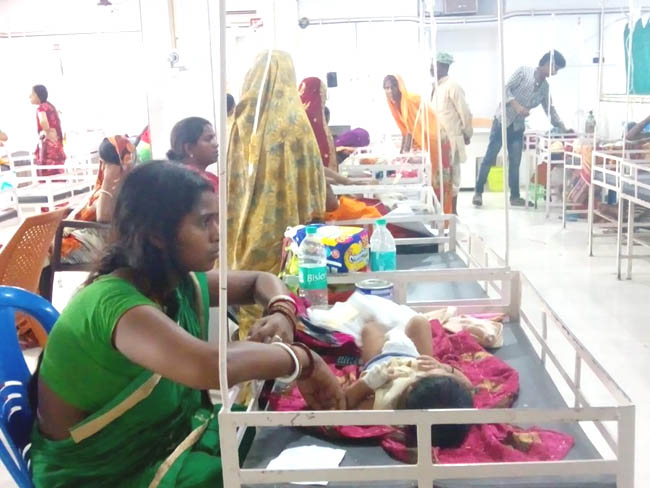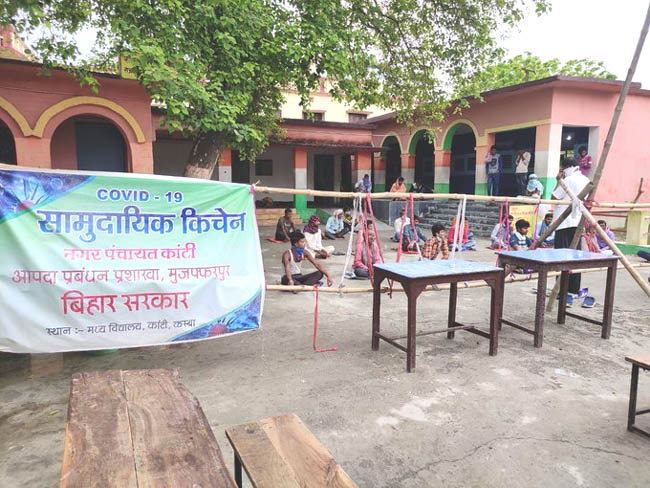|
13/05/2020 Virus Infects, But Poor Governance Kills the Poor
|
The outbreak of the COVID-19 epidemic has once again brought into public view the abysmal state of health infrastructure in the state of Bihar. Going by the state government’s own acknowledgement, 29 of its 38 districts have zero ICU beds, 28 districts have zero ventilator beds, and 20 districts have fewer than 100 isolation beds (Indian Express, Delhi Edition, 27April 2020). There are just seven centres for the COVID-19 test with the optimal testing capacity of 1800 samples a day; obviously too meagre for a state with a population of more than 12 crores. After more than a month of the outbreak of the epidemic, two private facilities are being added to the list but these centres have to send the samples by road to Kolkata and Gurugram respectively taking almost a week for the reports to arrive (Indian Express, Delhi Edition, 11 May 2020).Surprisingly though (not really if you know the way system works there), during March 31 and April 12, despite these extraordinary times, 362 government doctors were found to be absent from hospitals while on duty (https://www.indiatoday.in/india/story/362-bihar-doctors-missing-during-duty-hours-1674925-2020-05-06). With the ongoing return of migrants to the state, its facilities for quarantine, testing, and the overall maintenance of health and hygiene are stretched to its limits. But the problem is not merely the lack of healthcare infrastructure facilities or the non-availability of healthcare services in terms of doctors, para-medical staff and the like; a necessary consequence of decades of neglect of and underinvestment in the social sector.The problem gets compounded by the persistent the-business-as -usual ethos of the officialdom where the focus remains on procedural adherence to seamless paperwork (khanapuri) irrespective of any concern with the effective policy outcomes. This takes us to the heart of the culture of mal-governance that has become an entrenched aspect of everyday life in the state.
Generations of Biharis have been brought up on the myth of Bihar being the best governed state in the 1950s. And, they have been told this ad nauseum with reference to the unquestioned authority of Paul H. Appleby, a public administration consultant with the Ford Foundation, who authored two reports in 1953 and 1956 respectively on the governance problems of the country. Indeed, these reports exist but there is nothing in them to generate the sense of false pride that has been purveyed around amongst the unsuspecting Biharis. In fact, for long Bihar has witnessed an inexplicable disconnect between a heightened degree of politicization among the masses and a generalized political culture of apathy and indifference towards governance in general and the delivery of public services in particular. Caste-based patronage networks and the symbolic balancing acts between communities (be it the allocation of ministerial portfolios, the appointments and transfer of bureaucrats, and even the administering of punitive action to the erring government officials) have given rise to a set of parameters to judge the administrative calibre and efficiency of a babu that bears little resemblance to the desirable norms of impersonal and outcome-based appraisal. Arguably, there comes into being a parallel structure of authority which undermines the legitimacy of state structures and compromises the quality of rule-bound administration. So, you hear of a police officer brutally beating up a doctor, or a BDO not paying any honorarium to the staff (and pocketing it himself) hired to assist the state machinery in quarantine centres. Uglier still, those in charge of bigger quarantine centres are seen as a happier and luckier lot as they can make more money by cutting per capita costs on food and provision given the higher volume of allocation involved. Logically, they would wish for more quarantine centres and more COVID-19 patients to optimise the gains in a situation of crisis where opaqueness becomes the norm and accountability takes a back seat. Those in know are wont to say that there is nothing better than a relief operation during a crisis to make a fast buck without the minimal fear of being caught. Earlier it would be the onset of floods; now it is the outbreak of COVID-19.
The institutional corrosion of legitimate structures of control and command leads to a culture of governance which singularly lacks an overall sense and purpose of public service as the leitmotif of manifold administrative itineraries. Rather, these itineraries become ends in themselves. One sees this happening through the visual images of state officials filling in registers with the names, addresses and Aadhar numbers of migrants, filing the reports on the number of food packets and water bottles distributed, the number of buses arranged, and the list of quarantine centres in a block and their holding capacity per panchayat. But they also reveal their total lack of empathy with the sufferings of people. There have been numerous reports (till the media have been banned from these centres as an ironical tribute to democratic transparency by Sushasan Babu) of people being beaten up in quarantine centres as and when they protest about the quality of food or the frequency of its distribution, or the lack of toilets and mosquito nets. People thus become incidental to the game of bureaucratic paper trail originating from the state secretariat in Patna and ending up in a village panchayat. Of course, such an administrative culture has not come overnight. It is the result of decades of systematic undermining of the administrative machinery to serve the narrow sectional sectarian interests of dominant classes and communities. For years, one has seen that even if someone is a highly corrupt or inefficient officer s/he gets promoted to the highest post because s/he belongs to the right community. One has heard that many a times an investigation into an official’s acts of omission and commission gets inordinately delayed to ensure non-punishment to the erring one.One has experienced as to how complaints against an official get blocked at multiple levels because all of them (super-ordinates and subordinates alike) are either complicit in the game of making money or procedural impropriety or share the same social capital or has the blessings of the influential people. And, the list goes on. As a consequence, people start to lose faith in the fairness and the administrative capability of the state machinery. Not surprisingly, people dread getting quarantined in a government-run centre or visiting a government hospital. If they do so, it is because they lack the means to avoid them and are too desperate to survive anyhow given their disabling penury and wretchedness. It is often said that people get the leaders they deserve. In Bihar, instead, people have got the officials they deserve and deserved. After all, officials belong to the same society, and have largely internalised the prevailing societal ethos. In a poor state like Bihar, getting a sarkari job, even when it is contractual, is akin to getting a lottery ticket. Once you get a job, you try to do what society expects you to do (surreptitiously, though in morally encouraging way): shirk the work to the extent possible and use all the ingenious ways at your disposal to make extra income (the misappropriation of public money has almost started getting seen in amoral terms by the public at large). And, to cover them up keep throwing your weight around. This is true irrespective of rank, status and job profile. It is no one’s argument that all officials are corrupt, or all of them are shirkers. But the dominant common sense looks at a government job as a life of permanent security (at least till contractual appointment became the norm) and endless possibility of enhancing one’s income and status. No English word can capture the akad (the projected sense being someone of great consequence) that defines even a lowly government official. Not surprisingly, people queue up to become peons and attendants in an office because they know only too well that once there they can show off their dhauns (another untranslatable word) to all and sundry. Now, extrapolate this ethos to the everyday working of a public hospital and see what you get. The ward boy will not touch your patient or help you out with the stretcher or a wheel chair (provided they are there) till you give him some money or are known to him through caste, kin or political consideration. The clerk at the reception will give you the frowning look before he does the necessary paper work without which you will not be admitted because your arrival there has supposedly delayed his leisurely breakfast / lunch or at least disrupted the rhythm of his khaini-making or endless chit-chat. The nurse will look gloomy and sulking because she has never property attended a nursing college before being appointed (large number of government nurses are in this category and cannot even hold a syringe properly) or is too tired of patriarchy-ordained household chores before she came to work. The pharmacist willgesture a big no to most of the medicines written in your prescription because he is already party to the siphoning off of the medicines with the active connivance of stores clerk and the other relevant officials in the medical establishment. All these experiences you accumulate provided you have been fortunate enough to see a doctor who has given you too remote and fleeting an attention to generate any confidence in you. In passing, one should not fail to note the reigning reticence of these doctors who rarely take the trouble of explaining anything to a patient in an intelligible language save writing medicines illegibly on a piece of paper under the obligatory fondness of pharmaceutical companies which may have organised their last family vacation in a touristy place. Exceptions apart, this is the archetypal work culture of a public hospital – from the Primary Health Centre (PHC) to the Government Medical College. Can you expect this culture of mal-governance to transform itself into a culture of efficient delivery of quality healthcare simply because the state health secretary has started tweeting notifications or the Chief Minister has increased the frequency of review meetings? These are discomforting questions, and surely call for collective soul-searching. Metaphorically speaking, virus Infects; but its poor governance that kills the poor!
|
|



